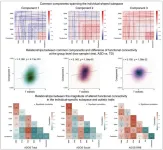(Press-News.org) In recent years, microbiome research has started to shift its focus from the microbes themselves to the molecules they produce. After all, it’s these molecules that directly interact with human cells to influence a person’s health. But trying to identify which molecules are being made by a person’s microbiome is quite challenging. A typical metabolomics study can only characterize about 10% of the molecular data from a human microbiome sample.
In a new study published on December 5, 2023 in Nature, microbiome experts at University of California San Diego debut a new approach they call “reverse metabolomics.” The technique combines organic synthesis, data science and mass spectrometry to better understand what molecules are being secreted by the microbiome and how they affect human health.
In their first application of reverse metabolomics, the scientists found hundreds of molecules that had never been observed in the human body before. Using this novel data, they were able to identify a new metabolomic signature for inflammatory bowel disease (IBD). The authors say these molecules could someday serve as a biomarker for diagnosing IBD, or as a potential therapeutic target to help treat the disease.
“We know the microbiome is important, but we don’t know what kinds of molecules the microbes produce or how influential they are in the human body,” said senior author Pieter C. Dorrestein, PhD, professor at Skaggs School of Pharmacy and Pharmaceutical Sciences at UC San Diego. “Reverse metabolomics helps us evaluate whether specific molecules can be found in the samples, predict which microbes are producing them, and relate these metabolomic signatures to health and disease.”
In a typical metabolomics study, researchers will use a tool called mass spectrometry to look for different molecules in a sample. In this technique, each molecule has its own “barcode” that it can be identified by. Still, scientists need to know what these barcodes represent to describe the contents of a sample, which remains challenge.
In the new study, researchers in the Dorrestein Lab took a backward approach. First author Emily C. Gentry, PhD, now an assistant professor at Virginia Tech, used organic synthesis to first produce thousands of different synthetic molecules from four classes of interest, and then defined each of their barcodes.
The researchers then utilized publicly available metabolomics data including the ones previously collected through the Crohn’s & Colitis Foundation and searched for the new barcodes in that data. The findings revealed 145 of the synthesized bile acids were present in biological samples from public data, 139 of which had never been described before.
“If you read a biology textbook, none of these molecules will be in it,” said Dorrestein. “Not only are they new to our understanding of human physiology, they’re entirely new to science, which is pretty amazing.”
Gentry and colleagues then compared the metabolomic signatures of samples from different patient populations and found a strong association between a synthesized class of microbial molecules — bile amidates — and IBD. This association was then validated across multiple cohorts, supporting the idea that these molecules are likely involved in the pathology of IBD.
Looking closer, the scientists noticed that certain bile amidates were elevated in patients with Crohn’s disease specifically when they had active symptoms, but this was not the case for patients with ulcerative colitis. Patterns like these could one day be used to help differentiate and diagnose specific types of IBD.
The researchers then began to explore how these molecules might be influencing gut health. Additional experiments showed that several bile amidate compounds may promote gut inflammation by dysregulating T cell function. For example, one microbial compound produced a six-fold increase of a key cytokine known to be involved in the pathogenesis of Crohn’s disease.
“We’re using organic synthesis and data science to better understand how our bodies work on a molecular level,” said Gentry. “We’re also one of the first studies to discover new human molecules using publicly available metabolomics data. As more metabolomics data becomes publicly available, reverse metabolomics will become even more informative.”
The authors say the molecules they’ve described could one day inspire new therapeutics for treating IBD. For example, patients might be treated with pills containing live microbes that secrete specific molecules, or drugs that inhibit the enzymes these disease-associated molecules interact with.
“This is a remarkable achievement derived from our precision nutrition initiative, in which Dr. Dorrestein previously demonstrated that reverse metabolomics could identify food metabolites associated with disease severity in patients with IBD,” said Andrés Hurtado-Lorenzo, PhD, senior vice president of Translational Research & IBD Ventures at the Crohn’s & Colitis Foundation. “Now, this groundbreaking work has further progressed to discovering new metabolites that hold potential for both diagnostic and therapeutic applications in IBD.”
Co-authors of the study include: Morgan Panitchpakdi, Pedro Belda-Ferre, Marvic Carrillo Terrazas, Hsueh-han Lu, Simone Zuffa, Julian Avila-Pacheco, Damian R. Plichta, Allegra T. Aron, Mingxun Wang, Alan K. Jarmusch, Mashette Syrkin-Nikolau, Brigid Boland, Amy Hemperly, Niels Vande Casteele, Hiutung Chu, Rob Knight and Dionicio Siegel at UC San Diego; Stephanie L. Collins, Fuhua Hao and Andrew D. Patterson at The Pennsylvania State University; Allison K. Stewart and Erin S. Baker at North Carolina State University; Tingting Yan and Frank J. Gonzalez at National Institutes of Health; Hera Vlamakis, Clary B. Clish and Ramnik J. Xavier at Broad Institute of MIT and Harvard; and Ashwin N. Ananthakrishnan at Massachusetts General Hospital.
The study was funded, in part, by the National Institutes of Health (grants R01GM107550, R01AI67860, U01 DK119702, R00DK110534, P30ES025128, P42ES027704, P42 ES031009, T32DK007202 and ES103363-01), the Collaborative Microbial Metabolite Center (grant R01DK13611701), the Crohn’s & Colitis Foundation (grant 675191), the Center for Computational Mass Spectrometry (grant P41GM103484), a cooperative agreement with the United States Environmental Protection Agency (STAR RD84003201), the Pennsylvania Department of Health, the Tombros Foundation, the National Academies of Sciences, the Gordon and Betty Moore Foundation and the Howard Hughes Medical Institute Graduate Fellowships.
# # #
END
Reverse metabolomics: new method finds biomarker for inflammatory bowel disease
UC San Diego scientists develop groundbreaking approach to microbiome research, improving its ability to explain and treat disease
2023-12-05
ELSE PRESS RELEASES FROM THIS DATE:
Older organs accelerate aging in transplant recipients
2023-12-05
Most organ transplantations involve supply from older donors to younger recipients. Aging cells can become senescent, a condition in which they stop multiplying and secrete chemicals that negatively affect neighboring cells. Senescent cells accumulate in older donor organs, and have the potential to compromise transplant outcomes.
A study led by researchers from Brigham and Women’s Hospital, a founding member of the Mass General Brigham healthcare system, found that in preclinical models, transplanting older organs can trigger ...
Pregnant women are missing vital nutrients needed for them and their babies – and situation could worsen with plant-based foods
2023-12-05
Pregnant women are not getting the essential nutrients they and their babies need from modern diets say scientists, who have warned that the situation will likely worsen as more people turn to plant-based foods.
A study looking at the health of expecting mothers from high-income countries, including the UK, New Zealand and Singapore, found that 90 per cent were lacking key vitamins necessary for healthy pregnancies and the wellbeing of unborn infants.
Scientists from the University of Southampton, working with experts worldwide, surveyed more than 1,700 women and found most were missing essential nutrients found in abundance in meat and dairy products.
These included vitamins B12, B6 and ...
Cell-type-specific genetic risk contributes to distinct stages of Alzheimer’s disease progression
2023-12-05
Developing treatments for Alzheimer's disease (AD) is difficult because complex underlying mechanisms drive different types of cells that may contribute to the disorder. Microglia and astrocytes, resident immune and support cells in the central nervous system, are known to exclusively express several genes linked to risk of AD — particularly AD dementia. However, it was previously unclear exactly how and when these genetic risk factors contributed to other, distinct stages of AD progression, such as the accumulation of amyloid-β plaques and tau tangles.
Researchers led by a team at Brigham and Women’s Hospital, a founding member of the Mass General Brigham healthcare ...
Argonne physicist recognized for “Top Cited Paper” by Institute of Physics
2023-12-05
A paper co-authored by physicist Filip Kondev of the U.S. Department of Energy’s (DOE) Argonne National Laboratory has earned a “Top Cited Paper Award” from IOP Publishing, the publishing arm of the Institute of Physics.
The paper, “The NUBASE2020 evaluation of nuclear physics properties,” provides researchers with recommended values of the basic nuclear physics properties for all known atomic nuclei. These data are provided for each nucleus in its ground state, its lowest energy level, and in its excited, isomeric state, a higher energy level that lives longer than what is typical. These data constitute the fundamental ...
Researchers identify altered functional brain connectivity in autism subtypes
2023-12-05
Philadelphia, December 5, 2023 – What happens in the brain to cause many neurodevelopmental disorders, including autism spectrum disorder (ASD), remains a mystery. A major limitation for researchers is the lack of biomarkers, or objective biological outputs, for these disorders, and in the case of ASD, for specific subtypes of disease. Now, a new study uses brain imaging and machine learning to identify altered functional brain connectivity (FC) in people with ASD – importantly, taking ...
Tanyu collecting instrumentation data from RAP-aggregate base project on Minnieville road
2023-12-05
Tanyu Collecting Instrumentation Data From RAP-Aggregate Base Project On Minnieville Road
Burak Tanyu, Professor, Civil, Environmental and Infrastructure Engineering (CEIE); Director of CEIE Laboratories, received $36,674 from the Virginia Department of Transportation (VDOT) for: "Collection of Instrumentation Data From the RAP-Aggregate Base Project on Minnieville Road."
Mason's Sustainable Geotransportation Infrastructure (SGI) research team has access to an actual roadway site located in Minnieville, Virginia, ...
Three decades of data in Bangladesh show elevated risk of infant mortality In flood-prone areas
2023-12-05
A new study from researchers at UC San Diego’s Scripps Institution of Oceanography and UC San Francisco estimates 152,753 excess infant deaths were attributable to living in flood-prone areas in Bangladesh over the past 30 years. Additionally, across the study period, children born during rainy months faced higher risk of death than those born in dry months.
The paper was published Dec. 5 in the Proceedings of the National Academy of Sciences and supported by the National Institute of Allergy and Infectious Diseases.
The findings begin to unspool the long term public health impacts of recurring environmental hazards such as flooding, ...
Mice pass the mirror test, a classic indicator of self-recognition
2023-12-05
Researchers report December 5 in the journal Neuron that mice display behavior that resembles self-recognition when they see themselves in the mirror. When the researchers marked the foreheads of black-furred mice with a spot of white ink, the mice spent more time grooming their heads in front of the mirror—presumably to try and wash away the ink spot. However, the mice only showed this self-recognition-like behavior if they were already accustomed to mirrors, if they had socialized with other mice who looked like them, and if the ink spot was relatively large.
The team identified a subset of neurons in the hippocampus that are involved in developing and storing this visual self-image, ...
Tonsil, adenoid removal improved sleep quality, some behavioral problems in children with mild sleep apnea
2023-12-05
The surgery did not improve the children’s neurodevelopmental functioning but was associated with improved quality of life, sleep symptoms, and blood pressure 12-months post-surgery according to a randomized control trial led by researchers at Brigham and Women’s Hospital and the Harvard Pilgrim Health Care Institute
Between 6% and 17% of children suffer from sleep-disordered breathing, characterized by habitual snoring, increased respiratory effort, and sleep apnea. If left untreated, the disorder may put children at higher risk of neurodevelopmental impairment, reduced quality of life, and cardiovascular and metabolic diseases. Enlarged tonsils are one of the main risk ...
Harvesting water from air with solar power
2023-12-05
WASHINGTON, Dec. 5, 2023 – More than 2.2 billion people currently live in water-stressed countries, and the United Nations estimates that 3.5 million die every year from water-related diseases. Because the areas most in need of improved drinking water are also located in some of the sunniest places in the world, there is strong interest in harnessing sunlight to help obtain clean water.
Researchers from Shanghai Jiao Tong University in China developed a promising new solar-powered atmospheric water harvesting technology that could help provide enough drinking water for people ...
LAST 30 PRESS RELEASES:
Transient Pauli blocking for broadband ultrafast optical switching
Political polarization can spur CO2 emissions, stymie climate action
Researchers develop new strategy for improving inverted perovskite solar cells
Yes! The role of YAP and CTGF as potential therapeutic targets for preventing severe liver disease
Pancreatic cancer may begin hiding from the immune system earlier than we thought
Robotic wing inspired by nature delivers leap in underwater stability
A clinical reveals that aniridia causes a progressive loss of corneal sensitivity
Fossil amber reveals the secret lives of Cretaceous ants
Predicting extreme rainfall through novel spatial modeling
The Lancet: First-ever in-utero stem cell therapy for fetal spina bifida repair is safe, study finds
Nanoplastics can interact with Salmonella to affect food safety, study shows
Eric Moore, M.D., elected to Mayo Clinic Board of Trustees
NYU named “research powerhouse” in new analysis
New polymer materials may offer breakthrough solution for hard-to-remove PFAS in water
Biochar can either curb or boost greenhouse gas emissions depending on soil conditions, new study finds
Nanobiochar emerges as a next generation solution for cleaner water, healthier soils, and resilient ecosystems
Study finds more parents saying ‘No’ to vitamin K, putting babies’ brains at risk
Scientists develop new gut health measure that tracks disease
Rice gene discovery could cut fertiliser use while protecting yields
Jumping ‘DNA parasites’ linked to early stages of tumour formation
Ultra-sensitive CAR T cells provide potential strategy to treat solid tumors
Early Neanderthal-Human interbreeding was strongly sex biased
North American bird declines are widespread and accelerating in agricultural hotspots
Researchers recommend strategies for improved genetic privacy legislation
How birds achieve sweet success
More sensitive cell therapy may be a HIT against solid cancers
Scientists map how aging reshapes cells across the entire mammalian body
Hotspots of accelerated bird decline linked to agricultural activity
How ancient attraction shaped the human genome
NJIT faculty named Senior Members of the National Academy of Inventors
[Press-News.org] Reverse metabolomics: new method finds biomarker for inflammatory bowel diseaseUC San Diego scientists develop groundbreaking approach to microbiome research, improving its ability to explain and treat disease






